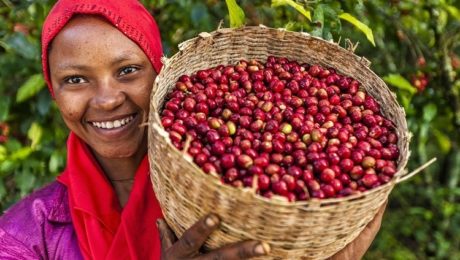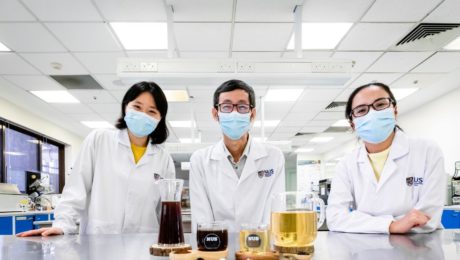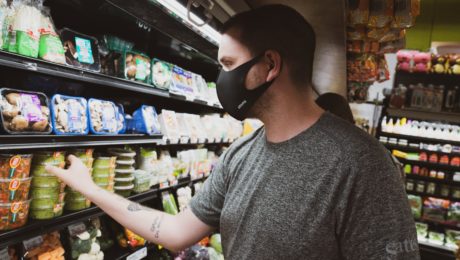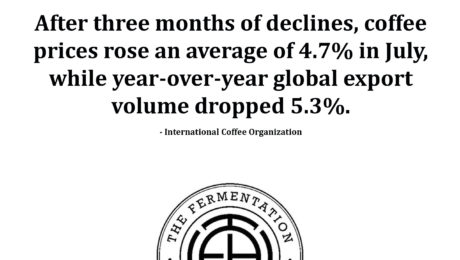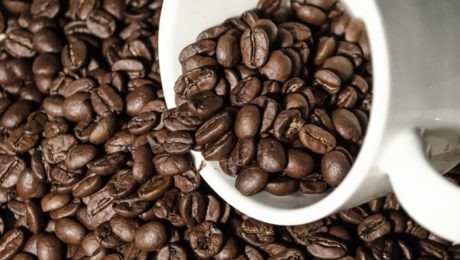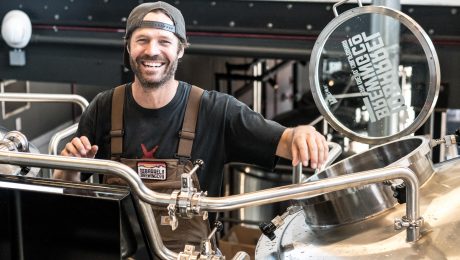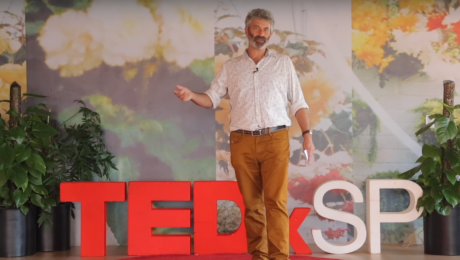Fermentation Time Shapes Coffee Flavor
Adding to the growing research on fermentation and its impact on coffee’s flavor, food corp Nestlé released their own study on the link between coffee and fermentation. Scientists found that the length of time coffee cherries (or beans) are fermented is key to final flavor. They plan to use their findings to “tailor specific fermentation conditions to different coffee varieties, allowing us to highlight new distinct natural flavors and sensorial notes.”
“While several favors affect coffee quality, we showed a subtle combination of specific fermentation conditions can lead to a modulation of the sensory properties of the final cup, opening new avenues to differentiate coffee taste in a fully natural way,” said Cyril Moccand, a scientist at Nestlé Research who led the study.
On August 11, The Fermentation Association will host a webinar with the Specialty Coffee Association “The State of the Art in Coffee Fermentation.”
Read more (Beverage Daily)
- Published in Food & Flavor, Science
New Fermented Coffee & Tea Drinks
Researchers from the National University of Singapore (NUS) have created new fermented coffee and tea drinks. These drinks, invented by a professor and two doctoral students, are being labeled as “probiotic coffee and tea drinks that are packed with gut-friendly live probiotics.” They claim that the drinks can be stored for three months without altering the probiotics.
“Coffee and tea are two of the most popular drinks around the world, and are both plant-based infusions. As such, they act as a perfect vehicle for carrying and delivering probiotics to consumers. Most commercially available probiotic coffee and tea drinks are unfermented. Our team has created a new range of these beverages using the fermentation process as it produces healthy compounds that improve nutrient digestibility while retaining the health benefits associated with coffee and tea,” explained NUS Associate Professor Liu Shao Quan.
Read more (Science Daily)
Pandemic Prompts Premium Purchases
More Americans are purchasing premium foods during the pandemic. Growth is fueled by Millennial consumers looking to have an “experience” from home, eating fancy food from their kitchen table during the pandemic rather than going out. Many fermented products are considered premium. According to market research firm IRi, five of the top 15 food categories with a “premiumization” effect are fermented products: spirits, beer/ale/cider, wine, coffee and yogurt.
Read more (IRI Worldwide)
- Published in Business, Food & Flavor
Coffee Conquers Colon Cancer?
A new study links drinking coffee to higher survival rates from colon cancer. Researchers found that in 1,171 patients treated for metastatic colorectal cancer, patients who drank two to three cups of coffee per day were likely to live longer. They also had a longer time before their disease worsened. Patients who drank four or more cups of coffee a day had an even greater benefit.
“It’s known that several compounds in coffee have antioxidant, anti-inflammatory, and other properties that may be active against cancer,” says Chen Yuan, study co-author and research fellow at the Dana-Farber Cancer Institute.
The study results, published in the peer-review journal JAMA Oncology, said coffee benefits were both for caffeinated and decaffeinated varieties. “Study authors emphasize the report was only able to find an association, not a cause-and-effect relationship. Experts say the study doesn’t provide sufficient evidence to recommend drinking coffee on a daily basis for people who have cancer.”
Read more (USA Today)
Coffee Prices Rise; Volumes Decline
After three months of declines, coffee prices rose an average of 4.7% in July, while year-over-year global export volume dropped 5.3%.
- International Coffee Organization
- Published in Business
How Does Fermentation Impact Your Cup of Coffee?
How does fermentation impact your cup of coffee? Fermentation in coffee processing may be one of the most misunderstood fermentation mediums. But, VinePair notes, “The fermentation process is critical to shaping a coffee’s flavor because, like wine, it produces the cup’s acidity and fruit notes through the breakdown of sugars by yeast and bacteria. Because coffee cherries start to ferment soon after picking, how the farmer or local cooperative handles that process has a direct impact on the coffee’s eventual flavor. Processing methods vary by geography, climate, logistics, and tradition, but the three main types are natural, honey, and washed.”
Read more (VinePair)
- Published in Food & Flavor
Coffee Prices Surge During Pandemic
The coronavirus outbreak forced coffee prices to spike in April, with coffee futures estimated to rise 15% in May. Though prices are high, coffee farmers internationally are suffering. The COVID-19 lockdown in Colombia is disrupting coffee exports, the lockdown in Brazil is causing container shortages and a locust invasion in East Africa is hurting harvests. Despite rising prices, consumers are still purchasing coffee. CNBC analysts suggest the price increase could be short lived, as coffee shops reopen again and the public begins consuming stockpiled coffee supplies.
Read more (Food Dive)
- Published in Business
New College Fermentation Program Aims to Prepare Students for Careers in Craft Beer, Kombucha, Mead, Cider, Coffee Industry
Fermented drinks are becoming a major part of the food industry, and San Diego’s Mesa College is taking notice. Mesa College is offering a new Fermentation Management Certification Program. The program aims to prepare students for a variety of careers in San Diego’s $1.2 billion craft beer industry. But the program focuses on other fermented beverages as well, like kombucha, mead, cider, coffee and tea. In the 30-unit course, students will learn the basics of brewing and learn the business side of running a brewery, from sales, marketing, law, accounting, importing, distribution and operations. “There’s so much fermented beverage going on, that there’s gotta be at least 250 companies out there looking for qualified people,” said adjunct faculty member Kevin Rhodes, who co-founded Groundswell Brewing.
Read more (NBC San Diego)
- Published in Business
The Science of Coffee, How Fermentation Has Changed the Coffee Industry
This morning, you probably had a cup of one of the most popular fermented beverages: coffee. The Growler magazine article “Science of Coffee: the changing chemistry of coffee beans from farm to cup” details how coffee makers have embraced fermentation in recent years “to take maximum advantage of beans’ unique potentials. … The fickle nature of fermentation’s microfauna plays a bigger role in coffee than even many coffee industry people understand.” One coffee company founder shared the story of buying a unique variety of Colombian coffee with incredible flavor. When he bought the brand a year later, the flavor wasn’t as good. The reason — the bean grower started making good money off the coffee, and upgraded the wood fermentation tank to a stainless steel tank. “That totally changed the coffee.”
Read more (The Growler)
Sandor Katz on the Fermentation Phenomenon
It’s absurd to call fermentation a new food trend, says Sandor Ellix Katz, author of “The Art of Fermentation” and “Wild Fermentation.” Fermenting practices date back to early man. But, after decades of active pasteurization and a war on bacteria, fermentation is experiencing an awareness as a food phenomenon, Katz says.
Katz – who calls himself Sandorkraut, the fermentation revivalist – spoke at a TEDx Talk in Sao Paulo on wild fermentation and the power of bacteria. Coffee, bread, cheese, beer, wine – Katz points to these as examples of “the greatest delicacies that people around the world enjoy, products of fermentation that have never gone out of style and have not recently just come into style.”
No one needs to master biology or study microorganisms to practice fermentation, Katz stresses. Before microbiology became a field, fermentation historically was viewed as mysterious or mythical because no one understood the mechanisms of it. He adds: “I cannot find one single example of a culinary tradition anywhere the does not incorporate fermentation.”
Microbiology has illuminated and harmed fermentation. For decades, the information surrounding bacteria and microorganisms was negative. People were taught the dangers of bacteria and disease – and grew to fear fermentation. But discoveries in microbiology also found that everything we eat, plant and animal, is populated by microorganisms. All life is descended and created from bacteria.
“In a way, we’re bacteria super structures,” Katz said. “For the first time, from the scientific analysis, we began to understand that fermentation is the transformative action of microorganisms.”
Fermentation often gets a bad reputation because people consider fermenting the process rotten or spoiled food. But fermentation is manipulating environmental conditions to encourage the growth of good organisms and discourage the growth of bad organisms, Katz explains.
“Fermentation is making food that is more stable than the raw product of agriculture that we began with,” Katz says. “We’re creating something that is more delicious, we’re creating something that is more easily digestible, we’re creating something where some toxic compound in the food and the otherwise dangerous food is made safe.”
For the first time in history, science is revealing the benefit of eating the live bacteria in fermented foods. The prevalence of antibiotic drugs, antibacterial cleaning products and chlorinated water now kill all bacteria in food. This war on bacteria narrows the diversity of bacteria in our intestines, Katz points out.
“If they were to kill all those microorganisms, we couldn’t possibly exist because we rely on those microorganisms for our digestion, for our immune system, our ability to withstand disease our brain chemistry,” he says. “Yet this chemical exposure…narrows biodiversity that we have inside of us.”
Katz focuses his work on public education of fermentation, helping shed light on its safety and effectiveness. More people today are seeking fermented foods because of the growing recognition of the benefits fermentation, Katz says. He teaches that the greatest benefit of fermented products are the bacteria themselves. Eating fermented foods – foods that haven’t been cooked or heat processed, since that kills the bacteria – restores the biodiversity in our intestines.
“In addition to being this important mode of transformation of food and beverages which enables people to make effective use of the food resources that are available to them, fermentation is also an engine of social change. And all of us are the starter cultures,” Katz said.
- Published in Food & Flavor, Science

